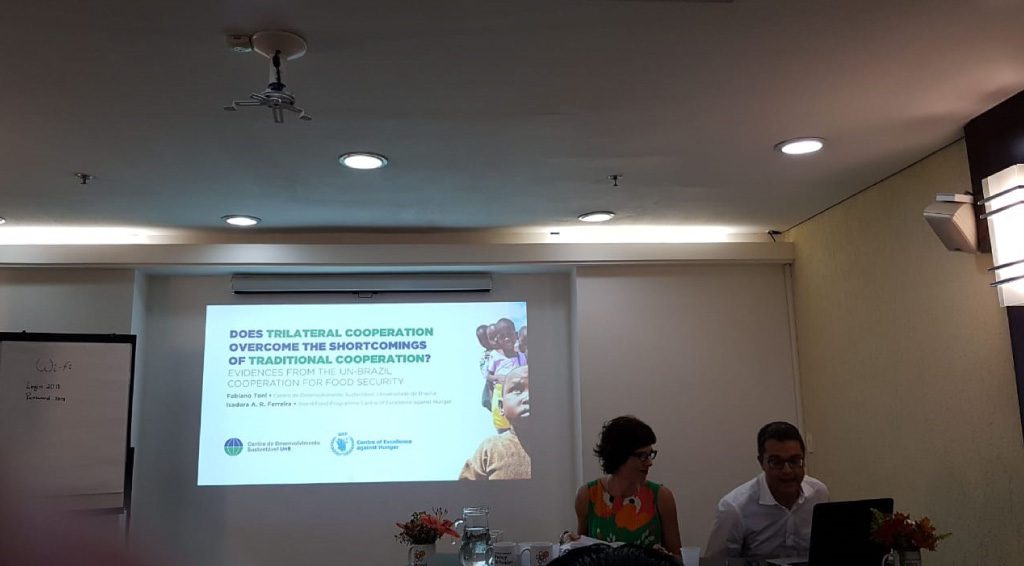
Sao Paulo hosted the International Conference on Policy Diffusion and Development Cooperation from 16 to 19 May. The event aimed at building a global network to promote dialogue among scholars interested in two research traditions, policy diffusion and development cooperation. The goal was to foster research and debate on cutting-edge themes in both fields. The WFP Centre of Excellence against Hunger presented two different papers at the conference.
Christiani Buani and Bruno Magalhães, from the WFP Centre’s Programme Unit, presented the paper “An evidence-based policymaking in the Global South: knowledge exchange setting African agendas for development”. The presentation was part of the Diffusion of Social and Economic Agendas panel. The second paper, presented at the Social Policy Diffusion panel, tried to answer on question, “Does trilateral cooperation overcome the shortcomings of traditional cooperation? Evidences from the UN-Brazil cooperation for food security”. The research was authored by Fabiano Toni, professor at the Centre for Sustainable Development of the University of Brasilia, and Isadora Ferreira, communications officer of the WFP Centre.
According to the event organizers, “policy diffusion and development cooperation are two intrinsically intertwined fields of research. However, each research area has followed a specific path, resulting in development of independent research agendas and the emergence of specific concepts, methods and theories to interpret their objects of study. In many ways, analysis of issues from the current global order would benefit if these two disciplines became closer.”

They also argue that “policy diffusion frequently takes place directly or indirectly via international cooperation. Sometimes, diffusion is a key part of development cooperation projects. This became more frequent in the realm of the so-called south–south cooperation, where policy models developed in emerging economies such as Brazil were transferred to Latin America, Africa and Asia.”
Amidst this debate, the work of the WFP Centre of Excellence rises as an example of policy diffusion via South-South cooperation initiatives. Buani and Magalhães discuss the WFP Centre’s approach to generate knowledge that can lead to new patterns of behaviour among policymakers. The authors used as example the interactions of the WFP Centre with the African Union since 2012. The Centre has partnered with the African Union to raise awareness with member states for the importance of investing in school feeding as a strategy to promote social and economic development. The result was increased commitment to the school feeding agenda in partner countries and improved technical and political support for national school feeding initiatives.
Toni and Ferreira investigated if the WFP Centre of Excellence, a trilateral cooperation arrangement set by the Brazilian government and the United Nations World Food Programme, represents a new model of cooperation for policy innovation. The authors argue that trilateral cooperation agreements under the auspices of the Centre of Excellence against Hunger move away from foreign aid and traditional cooperation based on policy transfer. This kind of cooperation can help developing countries rethink development in their own terms. “However, that is not something that will happen in the short-run, whereas food emergencies and disaster relief demand prompt action. Also, national governments may choose policy options with more immediate impacts and higher visibility and electoral payoffs. In this sense, trilateral and traditional cooperation are complementary rather than competing models of policy diffusion,” concludes the authors.




